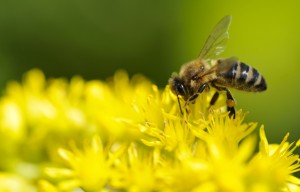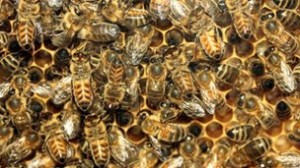
Robohub.org
‘Green Brain’ aims to build robot bees

Researchers at the University of Sheffield and Sussex are trying to build an artificial honey bee brain. Called ‘Green Brain’, this project aims to simulate insect sensory systems, primarily seeing and smelling, and offers many benefits particularly in the areas of agricultural robots, or even search and rescue.
As featured today on BBC news …
Honey bees are well known for their unerring ability to find their way back to a colony or hive. They are believed to use the position of the sun as a reference point and can compensate for its movement across the sky when calculating the route they need to return home.
“Because the honey bee brain is smaller and more accessible than any vertebrate brain, we hope to eventually be able to produce an accurate and complete model that we can test within a flying robot,” said Dr Marshall.
Dr James Marshall, leading the £1 million EPSRC1 funded project in Sheffield, said: “The development of an artificial brain is one of the greatest challenges in Artificial Intelligence. So far, researchers have typically studied brains such as those of rats, monkeys, and humans, but actually ‘simpler’ organisms such as social insects have surprisingly advanced cognitive abilities.”
Called “Green Brain”, and partially supported with hardware donated by NVIDIA Corporation, the project invites comparison with the IBM-sponsored Blue Brain initiative, which is developing brain modeling technologies using supercomputers with the ultimate goal of producing an accurate model of a human brain.

The hardware provided by NVIDIA is based on high-performance processors called “GPU accelerators” that generate the 3D graphics on home PCs and games consoles and power some of the world’s highest-performance supercomputers. These accelerators provide a very efficient way of performing the massive calculations needed to simulate a brain using a standard desktop PC – rather than on a large, expensive supercomputing cluster.
“Using NVIDIA’s massively parallel GPU accelerators for brain models is an important goal of the project as they allow us to build faster models than ever before,” explained Dr Thomas Nowotny, the leader of the Sussex team. “We expect that in many areas of science this technology will eventually replace the classic supercomputers we use today.”
Green Brain’s researchers anticipate that developing a model of a honey bee brain will offer a more accessible method of driving forward our knowledge of how a brain’s cognitive systems work, leading to advances in understanding animal and human cognition. “Because the honey bee brain is smaller and more accessible than any vertebrate brain, we hope to eventually be able to produce an accurate and complete model that we can test within a flying robot,” said Dr Marshall.
For full release from the University of Sheffield





